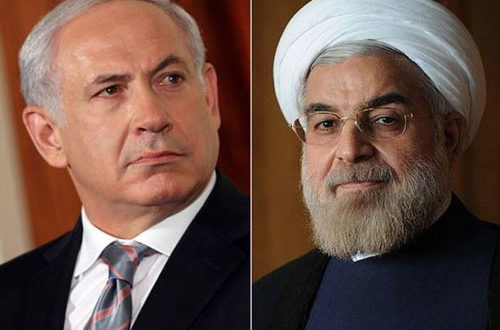Abdel Bari Atwan
The question is not whether Israel and Iran will come to blows, but when, where and how
The common theme in the statements being made these days by Iranian and Israeli leaders is that their fingers are on the trigger, amid mounting predictions of an imminent outbreak of war between the two sides – whether a limited one in Syria or an all-out war on four fronts: Lebanon, Syria, Iran and Occupied Palestine.
The strongest warning yet from the Iranian side was delivered by Revolutionary Guard Commander Gen. Hossein Salami at Friday prayers in Tehran’s central mosque. “Do not trust your military bases and capabilities,” he was quoted as saying, “the missiles are ready to be launched the moment you carry out any attack on us.” He went on: “We have learned how to achieve victory over enemies anywhere. Israel is a state with no depth and no foundations. Do not pin your hopes on America and Britain. There will be no trace of you left once they come to your rescue.”
For his part, Iranian army commander Gen. Abdolrahim Mousavi gave Israel a life expectancy of no longer than 25 years, meaning that it will have ceased to exist by then. This is the first remark of this nature by such a high-ranking Iranian since former president Mahmoud Ahmadinejad spoke of Israel being wiped off the map, earning him much criticism both at home and abroad.
On the Israeli side, the dominant issue in TV discussion programmes and newspaper commentaries is not whether war will break out or not. That is taken for granted. There is a firm conviction that war is inevitable, and the debate is only about its location and timing, its outcome, and from where the first spark or raid that ignites it will come.
After visiting Tel Aviv and being briefed by senior military commanders, American columnist Thomas Friedman bet that the next war in Syria would be between Israel and Iran. Israeli Chief of Staff Gadi Eizenkot for his part affirmed that it would occur before the end of the year, while Britain’s. The Times newspaper said it would redraw the map of the Middle East. Meanwhile,
Security Minister Avigdor Lieberman, responding to a growing sense of apprehension and alarm, hastened to reassure the Israeli public after the Iranian army commander’s remarks, saying the Israeli army is prepared for war on several fronts and warning Iran not to test it.
The big question being asked is how this war will break out and who will deal the first blow, Iran or Israel. Several possible scenarios have been suggested, or can be deduced by reading between the lines of the threatening verbal exchanges and from discussions in the Iranian and Israeli media involving former and serving military leaders.
– The first scenario is for Israeli warplanes to launch a missile strike on an Iranian military position in Syria, prompting a seismic Iranian response either from Syria or Lebanon (Hezbollah) as a first stage.
– The second scenario is for the Israeli army to launch an all-out assault on Iranian military positions aimed at destroying them completely. The aim would be to prevent a major Iranian build-up in Syria that would be more difficult to confront and destroy later. Israeli commanders seem convinced that limited strikes on Iranian targets, such as the recent missile attack on the T-4 airbase, are no longer effective.
– The third scenario would be for Iran to launch a limited operation in retaliation for the killing of seven of its military personnel in the T-4 raid, either by attacking Israeli targets itself or getting Hezbollah to perform the task.
It is hard to tell which is the more likely scenario. What can be said is that military action by either side is unlikely before 12 May, when US President Donald Trump is due to review – and, all the evidence indicates, probably withdraw from — the Iranian nuclear deal.
Salami’s warning that Israel would be dealt a devastating blow if it were to attack recalls the one issued four months ago by Hezbollah leader Hassan Nasrallah, when he advised Israelis to escape from Palestine in good time, because if war breaks out they will be its fuel and it will be too late for them to flee.
The credibility of Iranian predictions that any war might be resolved quickly is enhanced by the fact the every war fought by Iran, its allies and its paramilitary offshoots over the past 20 years has ended in victory, whether in Syria, Lebanon or Iraq. Whereas Israel has failed in every war it launched over the same period, whether against Lebanon, the Gaza Strip or latterly Syria, where one of its warplanes was downed and most of the missiles it fired against the T-4 base were intercepted.
Russian Foreign Minister Sergei Lavrov served notice after the recent US-British-French missile attack on Syria that his country will no longer feel under any moral obligation to refrain from supplying Syria with advanced S-300 air defence missiles. This means that the use of these missiles – or rather a Russian green light for their use, as they are already present on the ground — might be the next ‘surprise’.
We are in no doubt that war is coming, regardless whether it is triggered by Israeli pre-emptive or Iranian retaliatory action. The war of words currently raging between the two sides could be the prelude. The current situation is unsustainable. Israel feels suffocated by Iran’s encroaching military tentacles, and it could well commit an act of folly that leaves it devastated. We can only wait, but this time, from a position of relative optimism about the likely outcome.
 Geostrategic Media Political Commentary, Analysis, Security, Defense
Geostrategic Media Political Commentary, Analysis, Security, Defense





